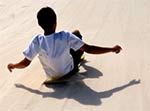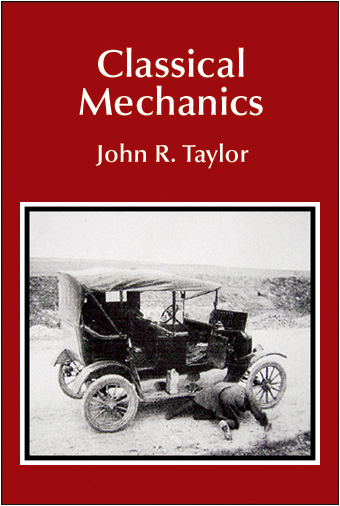PHYS 302
Analytical Mechanics
Syllabus, Fall 2021
We meet 11:00-11:50 am, MWF in SC 203.
Overview
Newtonian Mechanics based on the formulation of Lagrange and Hamilton. Applications to oscillations, orbital motion, scattering, rigid body motion. Special topics include chaos theory and relativity. Prerequisites: Phys 203, 204, Math 211, 212, or consent of instructor.
 How do macroscopic objects move under the influence of their surroundings?
How do macroscopic objects move under the influence of their surroundings?
$\myv{F}=m\myv{a}$ was Isaac Newton's (1643-1727) approach, which uses vectors to represent forces.
Joseph-Louis Lagrange (1736-1813) and William Hamilton (1805-1865) formulated scalar approaches which greatly expand the range of phenomena that can be analyzed.
In the late 20th century, we realized that a whole class of chaotic systems had a lot in common and could also be treated mathematically.
Some of the topics we'll study include:
- Origins and use of constants of motion;
- Motion with realistic friction;
- Calculus of variations and using the Euler-Lagrange equations;
- Holonomic and non-holonomic systems;
- Oscillation with friction, driving forces, coupling, and chaotic oscillators;
- Fourier analysis;
- Rotational and orbital motion; Frames of reference and coordinate systems, including accelerated ones;
- The Coriolis effect;
- Matrix methods, eigen frequencies and eigen modes for coupled oscillators.
Class Communications
You can find the syllabus and other materials related to
this course on the web at:
tiny.cc/gc-mech
Grades will be available on moodle.
Read your goshen.edu e-mail daily, as I'll send outside-of-class announcements that way.
 Professor Paul Meyer Reimer
Professor Paul Meyer Reimer
Sci 011 · +1.574.535.7318 (ofc)
paulmr@goshen.edu ·
+1.574.312.3395 (cell)
I don't have fixed office hours. You are welcome to stop by my office (SC 011) any
time! Here's my teaching schedule this term,

If you are off campus and want to make sure I'm available before coming to campus You may e-mail
or text me to make a time to get together.
Do not worry that you're "bothering me" when you stop by! Every time a student stops by it makes a good impression on me, and I think "Oh, they are taking charge of their own learning, and are taking the class seriously!".
Texts and Tools
 Required - Taylor, John R. Classical Mechanics. University
Science Books, 2005.
Required - Taylor, John R. Classical Mechanics. University
Science Books, 2005.
The Goshen College Bookstore has the book for rent (~\$58) and also some used copies (~\$109).
To discourage piracy, the publisher is offering a 20% discount (\$144.50 $\to$ \$115.60) on a new book.
Here are ordering instructions so your students can get the extra 20% Publisher's Discount. They would:***Note: the online order form automatically lists a 15% discount, but the warehouse will increase the discount to 20% before the order is processed.
- browse to our secure online order page at https://www.uscibooks.com/forms/winBookWebOrders.php,
- fill out the order form using their "goshen.edu" email address
- locate the box at the bottom of the form that says ADDITIONAL INSTRUCTIONS AND DISCOUNT CODES
- enter this discount code: "20% off for Goshen College student"
Also available is an e-book version (via redshelf.com to own (\$112) or rent (\$83).
Required - You'll be routinely "handing in" problem solving work that you do on paper. You'll need either a 3-ring binder with paper, or a spiral notebook.
We'll use Cocalc.com to visualize and solve homework problems (and perhaps some exam questions). If you haven't already set up an account, here are instructions on how to sign up - Make sure you use your GC e-mail address as your username!
Grading
| Assignments / Quizzes | 30% |
| 2 exams | 46% |
| 1 paper | 10% |
| demonstration project | 8% |
| participation and Out of Class activities | 6% |
Total grade outcomes:
| A- \ A | $\geq$ 90 \ 93% |
| B- \ B \ B+ | 80 \ 83 \ 87% |
| C- \ C \ C+ | 70 \ 73 \ 77% |
| Ds | 60-69% |
I may adjust this scheme down a bit (e.g. 89% might end up being good enough for an A), but I certainly won't adjust it up.
Assignments / Quizzes
For most class periods there will be readings, and reading questions assigned ahead of time. You will generally respond to those in Moodle. Sometimes you might type responses in to Moodle. Sometimes you might snap a picture of work you've done on paper and upload it into Moodle.
A number of problems (mostly from the textbook) will be assigned each week. You will work on these problems alone and together, before, during and after class.
Each week I'll ask you to hand in your problems, or else have a quiz. On quiz days, we will roll a dice to pick one of the homework problems assigned at random and you will solve it in class.
It's useful to keep a notebook as you try out solutions to problems, in addition to what you hand out. Include reflections and notes on your problem solving. What worked? What didn't work? Are there ideas that you still need to clarify? Which physics principles did you use for each problem?
If you get stuck on a problem, try to put into words the difficulty you're having. Refer to this later on when you check in with Paul or with a classmate.
Exams
Two exams will be given during the course, totalling 48% of your class grade. Whichever one you do better on will count for 27%.
Mechanics Demo Project
You may choose to do either the 'more material' project, or the 'mechanics demonstration' project. This is a group project which can be done in teams of 2 or 3.
More material - Choose a part of the text book that interests you which we do *not* cover, and work through at least three sections. Create a poster or slide deck outlining the sections you worked through, and hand in separately 6 "stars" worth of problems related to your chosen material.
Mechanics demonstration - Build a piece of apparatus that demonstrates some of the physics we did cover. Assemble a poster or slide deck explaining what you created and the physics behind it.
Some possible sources for demonstration projects:
- There is as a fascinating book of Demonstration Experiments in Physics, by Richard Sutton (1938) (see section II for ones related to oscillations),
- Consult the Physics Instructional Resources Association (PIRA) website.
- Google terms like 'physics mechanics demonstrations'.
Ask Paul about supplies and equipment
Phys 302 - Paper
Chose a 3-star problem from the textbook sections that we cover.
- You must pick your own problem: No two people will work the same problem.
- You *may* consult other people about your problem.
- Write up a solution with equations, diagrams as appropriate, and text which explains the approach you took to the problem, and references the physical principles you're using.
You'll prepare a first draft and give/receive feedback from one other classmate.
Here are more specific guidelines for the paper, and what to include.
Participation component
There are a number of habits that I would like you to develop in the course of this class that will contribute to your development as a physicist:
- Be prepared: Always bring a pen and your notebook and iPad to class.
- Share your work with others: Be ready to examine someone else's approach to problem solving and give feedback.
- Work at problem solving every day. Between reading asssignments for most class periods, and assigned problems you will have work to do every day.
- Come to class: No more than 3 absences during the semester. I do not need an excuse from you for up to 3 absences. However, if you know ahead of time
that you'll need to miss a class, let me know ahead of time too.
More than 3 absences? I will generally start asking you about how much you're working, what class load you have, what medical / psychological / romantic complications are occurring in your life, and will typically require a note from someone else (coach / doctor / therapist) justifying your absences (beyond 3).
* Dean's Office statement on plagiarism
assignments you submit in this course will be checked (for example, with "Turn-It-In" in Moodle) for plagiarized material copied from the web, other papers, online databases, and other sources. Cases of academic dishonesty are reported to the Associate Dean. Penalties for plagiarism are listed in the college catalog and range from redoing the assignment to dismissal from the college. Plagiarism entails the use of the ideas and/or words of a source without citation. Any borrowing of language (sentences, clauses, or distinct phrases) without the use of quotation marks is also plagiarism.
I expect to see notes in any work that you hand in about resources you used--other than the textbook or asking me--in figuring out how to solve a problem: A shout out to a classmate, a URL for a website you found useful, *even* (especially) if you found a solution to the exact problem or a similar problem online or in some other form.
Academic Success Center
goshen.edu/campuslife/asc.
The Academic Success Center (ASC) located in the Good Library offers
- tutoring and writing support,
- strategies for improving your organization and time management skills, and
- support services for students with documented disabilities
Accessibility Accommodations
Goshen College is committed to providing all students equitable access to programs and facilities. Students who need accommodations based on disability should contact the Academic Success Center (ASC). Students must register with the ASC before faculty are required to provide reasonable accommodations. For more information or to register, please contact the Director of Academic Success, Michelle Blank, Good Library 112, mblank@goshen.edu or 574-535-7526. To ensure that learning needs are met, contact the ASC the first week of classes. More information at: goshen.edu/asc/disability-services.
Schedule & Topics
|
30 August - 3 September
Monday 30 | |
|
6 September - 10 September
Monday 6 | |
|
13 September - 17 September
| |
|
20 September - 24 September
| |
|
27 September - 1 October
| |
|
4 October - 8 October
Friday 8 | |
|
11 October - 15 October
| |
|
18 October - 22 October
Monday 18 | |
|
25 October - 29 October
Monday 25 |
|
|
1 November - 5 November
Friday 5 | |
|
8 November - 12 November
| |
|
15 November - 19 November
Saturday 20 | |
|
22 November - 26 November
Wednesday 24 | |
|
29 November - 3 December
Friday 3 | |
|
6 December - 10 December
Monday 6 Tuesday 7 Wednesday 8 | |
|
13 December - 17 December
|